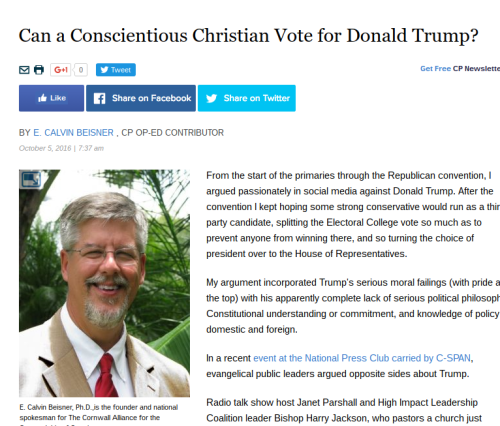Theologian Asks: Can a Conscientious Christian Vote for Trump?
Christians, particularly conservative Christians, have a tough road this general election season. For them, the Democratic nominee for president is not a viable option, and as long as the Democrats remain such enthusiastic cheerleaders for abortion, same-sex marriage, and assume other moral stances that Christians find odious, there really won���t be a supportable candidate in that party for the foreseeable future.
That should not be a big deal, normally, but this has been anything but a normal election season this time around. Typically, the Republican nominee for president maintains a conservative bearing, if not a reliably conservative political outlook, and represents a party that espouses ideas and values much more in line with those of Christians. Accordingly, that party is usually able to provide a nominee that, while hardly ideal, is reasonable enough.
The Republican nominee this time around, however, presents a bit of a challenge to many Christians. I don���t think many would disagree that Donald Trump has often exhibited behaviors, at a variety of levels, that would not pass muster when evaluated on the basis of the ���What would Jesus do?��� test. Beyond that, political positions that he has historically held are hardly in lockstep with those assumed by tried and true Christians.
On that note, in an op-ed piece for the Christian Post, theologian E. Calvin Beisner, Ph.D., talks himself���and us���through the possible embrace of a Trump candidacy.
I���ll not repeat all of what is contained therein, and you would be doing yourself a great service to read the article, because it is very good.
In nutshell, Beisner reminds us that Christians now live in a largely secular nation, and that while it may be possible to maintain a fairly strict adherence to Christian values in our own lives, the moment we have to interact and otherwise ���deal��� in the world outside of our own personal spaces, it becomes infinitely more difficult to do so while remaining fully oriented on the Word. This includes the matter of electing leaders for the country. If there is no viable candidate in the mix who is reflective of at least predominantly Christian values, ideology, and temperament, then we have no choice but to select the person we see as the better candidate from the available options. On that point, Beisner writes, in part:
���To put it starkly, if I were in a situation in which I faced a choice between stopping a man with a machine gun from mowing down a hundred innocent victims and stopping a man with a handgun from shooting ten, and I couldn't do both, I'd choose to stop the man with the machine gun. That choice would have a trade-off ��� allowing the man with the handgun to shoot the ten. It would also have the effect of having saved a net ninety lives.
���That's what the choice of the lesser of two evils means. So long as neither Jesus (the maximally good) nor Satan (the maximally evil) is on the ballot, the lesser of two evils exactly equals the greater of two goods, and in this fallen world that choice is inevitable.���
This excerpt does not do the piece justice ��� as I said, I think the article is excellent, and should be read in its entirety. However, it does provide a small glimpse into decision-making process in which folks like Dr. Beisner are engaging this time around. The bottom line is that while a ���lesser of two evils��� basis on which to select a leader seems like a raw deal, as long as we have every intention of waking up and moving forward as U.S. citizens on November 9 and beyond, then we have to steel ourselves to that outlook when each of us shows up at the polling station to cast a ballot on November 8.
Pragmatically speaking, what else can we do?
By Robert G. Yetman, Jr. Editor At Large




